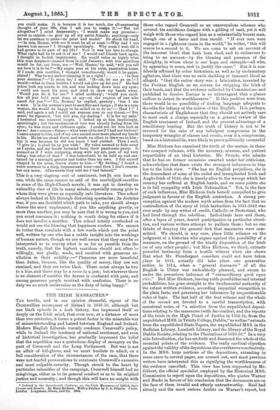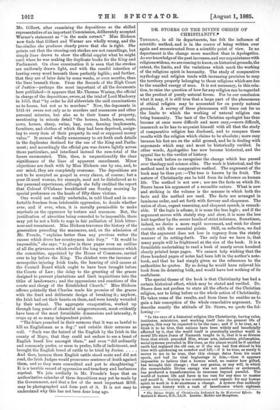THE IRISH MASSACRES"'
THE terrific, and in our opinion shameful, rigour of the Gromwellian reconquest of Ireland in 1649-50, although but one black episode in a dark history, has impressed itself so deeply on the Irish mind, that even now, at a distance of more than two centuries, it forms a potent factor in the miserable war of misunderstanding and hatred between England and Ireland. Modern English Liberals warmly condemn Cromwell's policy, while in Ireland the tendency of national sentiment, and even of historical investigation, has gradually impressed the belief that the expedition was a gratuitous display of savagery on the part of Cromwell and the Long Parliament. But war is not an affair of kid-gloves, and we must hesitate to admit, on a full consideration of the circumstances of the case, that there were not fearful provocations to extenuate Cromwell's excessive and most culpable severity. Though struck to the heart by particular calamities of the campaign, Cromwell himself had no misgivings, either as to its general conduct or as to its original justice and necessity ; and though this will have no weight with Ireland in the Seventeenth Century; or, the Irish Massacres of' 1641-2. their Causes and Results. By Mary Hickson. Witlra Preface by .1. A. Fronde. 2 vols. London Longumns, Green, and Co. 1E034. those who regard Cromwell as an unscrupulous schemer who covered his ambitious designs with a gilding of cant, yet it will weigh with those-who regard him as a substantially honest man, though one of a fierce and. iron mould. "If ever men were engaged in a righteous cause in the world," he writes, "this will scarce be a second to it. We are come to ask an account of the innocent blood that hath been shed, and to endeavour to bring to an account—by the blessing and presence of the Almighty, in whom alone is our hope and strength—all who, by appearing in arms, seek to justify the same." But it is con- fidently affirmed by sober historians, as well as by exclamatory agitators, that there was no such shedding of innocent blood as alleged; "that the entire story was a fabrication, invented by the Puritan English as an excuse for stripping the Irish of their lands, and that the evidence collected by Commissions and published to deceive Europe is so extravagant that a glance suffices to detect its worthlessness." If this position were true, there would be no possibility of finding language adequate to describe the infamy of the action of the English. It is, perhaps, characteristic of Englishmen that they should not actively care to meet such a charge, especially on a general review of the English treatment of Ireland, and the present advantage of a conciliatory bearing. But the truth of history is not to be reversed for the sake of any indulgent compromise in the temporary wrangles of classes and creeds, even if a compromise, based on a historical lie, were likely to prove politically successful Miss Hickson has examined the truth of the matter, in these two compact volumes, with the accuracy, acumen, and patient impartiality of an ideal historian. Mr. Fronde, who admits that he has on former occasions smarted under her criticisms, acknowledges that there exists the strongest influences to bias her to the Irish view. "She has no English prejudices, she is the descendant of some of the exiled and transplanted Irish and Anglo-Irish of 1649, she is keenly alive to the wrongs which her country has suffered at English hands, and on some points she is in full sympathy with Irish Nationalism." Yet, in the face of such influences, Miss Hickson finds herself compelled to give judgment in favour of the English contention. A strong pre- sumption against the modern myth arises from the fact that no contradiction of the story of Irish barbarities in 1641-1642 was ever made by any writer of credit, Catholic or Protestant, who had lived through the rebellion. Individuals here and there, after a lapse of years, denied participation in particular atroci- ties, and various writers attempt to palliate them; but no one thinks of denying the general fact that massacres were com- mitted. We should, in any case, place little reliance on the judgment of a historian who argues against the possibility of a massacre, on the ground of the kindly disposition of the Irish (or of any other people) ; bat Miss Hickson, we think, extracts powerful testimony from a hostile witness when she shows that what Mr. Prendergast considers could not have taken place in 1641, actually did take place one generation earlier, in 1614, when a "general massacre" of all the English in Ulster was undoubtedly planned, and sworn to under the precarious influence of "extraordinary good aqua vitce." But Miss Hickson, leaving aside possibilites and internal probabilities, has gone straight to the fundamental authority of the extant written evidence, according impartial recognition to the plain facts, and governing her inferences by unquestionable rules of logic. The last half of the first volume and the whole of the second are devoted to a careful transcription, with occasional notes, of "a selection from the unpublished deposi- tions relating to the massacres (with fac-similes), and the reports of the trials in the High Court of Justice in 1652-54, from the unpublished MSS. in Trinity College, D ublin," as well as "extracts from the unpublished State Papers, the unpublished MSS. in the Bodleian Library, Lambeth Library, and the library of the Royal Dublin Society, relating to the Plantations of 1610-39." In a very able Introduction, she has set forth and discussed the whole of the essential points of the evidence. The really cardinal objection against the validity of the depositions she overthrows conclusively. In the MSS. large portions of the depositions, extending in some cases to several pages, are crossed out, and most previous writers have interpreted this as signifying the worthlessness of the evidence cancelled. This view has been supported by Mr. Gilbert, the official specialist employed by the Historical MSS. Commission to report upon the depositions, who quotes Warner and Burke in favour of his conclusion that the documents are on the face of them invalid and utterly untrustworthy. Reid had already cast the most serious doubts on Warner's report, but
Mr. Gilbert, after examining the depositions as the skilled representative of an important Commission, deliberately accepted Warner's statement as "in the main correct." Miss Hickson now finds that Gilbert and Warner are wholly wrong, and the fac-similes she produces clearly prove that she is right. She points out that the crossing-out strokes are not cancellings, but simply lines drawn to show the official copyist what he might omit when he was making the duplicate books for the King and Parliament. On close examination it is seen that the strokes are uniformly drawn light, and with the careful intention of leaving every word beneath them perfectly legible; and further, that they are of later date by some weeks, or even months, than the lines beneath them. From the Records of the High Court of Justice—perhaps the most important of all the documents here published—it appears that Mr. Thomas Waring, the official in charge of the depositions, swore, at the trial of Lord Muskerry in 1653, that "by order he did abbreviate the said examinations as to losses, but not as to murders." Now, the deponents in 1641-44 swore not only as to murders and massacres and other personal miseries, but also as to their losses of property, mentioning in minute detail "the houses, lands, leases, rents, cows, horses, sheep, swine, hay, corn, farming implements, furniture, and clothes of which they had been deprived, assign- ing to every item of their property its real or supposed money value." It seemed wholly unnecessary to set forth such details in the duplicates destined for the use of the King and Parlia- ment; and accordingly the official pen was drawn lightly across those particulars, and interlined instead the sum-total of the losses enumerated. This, then, is unquestionably the clear significance of the lines of apparent cancelment. Minor objections are dealt with by Miss Hickson one by one, and, to our mind, they are completely overcome. The depositions are not to be accepted as gospel in every clause, of course ; but a poor ill-used woman, for example, need not be disbelieved as to her personal experiences, although she fully credited the report that Colonel O'Cahane breakfasted one Sunday morning by special preference on the heads of fifty-three victims.
One would not readily undertake, in cold blood and in com- fortable freedom from intolerable oppression, to decide whether ever, and if ever, when, it is morally permissible to make reprisals on the oppressor by torture and massacre. But, the justification of atrocities being conceded to be impossible, there may yet be not a little to urge in fair palliation of Irish bitter- ness and resentment. Miss Hickson traverses the history of the generation preceding the massacres, and, on the admission of Mr. Fronde, "explains better than any previous writer the causes which drove her countrymen into fury." "It would be impossible," she says, "to give in these pages even an outline of all the grievances which swelled the long remonstrance which the committee, appointed by the House of Commons, carried over to lay before the King. The chiefest were the increase of monopolies injuring Irish trade, the hearing of civil causes at the Council Board which ought to have been brought before the Courts of Law; the delay to the granting of the graces designed to prevent plantations and limit inquisitions into the titles of landowners; and the oppressions and exactions of the courts and clergy of the Established Church." Miss Hickson .affirms pointedly that Charles made his promise of the graces with the fixed and deliberate design of breaking it ; anyhow, the Irish had set their hearts on them, and were keenly wounded by their refusal. The aggregate exasperation, worked up through long years of shameful misgovernment, must evidently have been of the most formidable dimensions and intensity, it .crops up at so many independent points.
"The friars preached in their sermons that it was as lawful to kill an Englishman as a dog ;" and outside their sermons as well. "Such was the hatred of the English by the Irish in the county of Mayo, that they could not endure to see a beast of English breed live amongst them," and even "did ordinarily and commonly prefer, or seem to prefer, bills of indictment, and brought the English breed of cattle to be tried by Juries And then, because these English cattle stood mate and did not read, the Irish Judges would pronounce sentence of death against them, and so they were committed and put to slaughtering." It is a terrible record of oppression and treachery and barbarous reprisal. We join cordially in Mr. Fronde's hope that an authoritative calendar of these depositions may yet be made by the Government, and that a few of the most important MSS. may be photographed and form part of it. It is not easy to understand why this has not been done long ago.



































 Previous page
Previous page